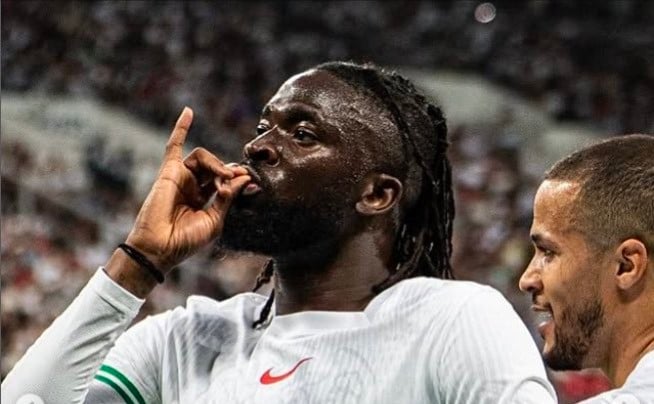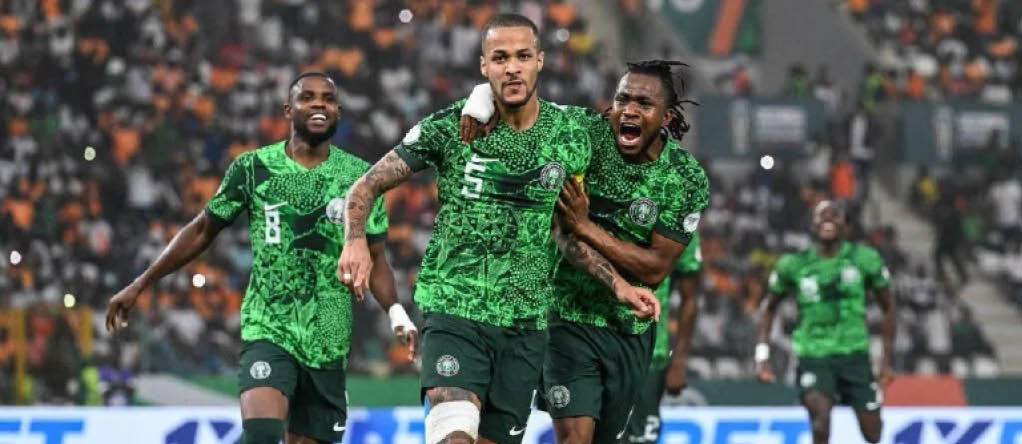World Cup Heartbreak: Super Eagles' Qualification Hopes Dented by South Africa Draw

The highly anticipated 2026 FIFA World Cup qualifier between South Africa's Bafana Bafana and Nigeria's Super Eagles, held at the Toyota Stadium in Bloemfontein, culminated in a 1-1 draw, significantly impacting the qualification hopes of both nations. This decisive clash was further overshadowed by an ongoing controversy surrounding South Africa's fielding of Teboho Mokoena in an earlier qualifier against Lesotho, a decision that could still lead to severe FIFA sanctions.
South Africa faces potential penalties from FIFA after midfielder Teboho Mokoena was fielded against Lesotho, despite having accumulated two yellow cards in previous matches, which should have resulted in an automatic suspension. Lesotho immediately filed a protest, demanding that South Africa be docked three points and the match result be overturned to a 3-0 defeat. According to FIFA’s Disciplinary Code, such a breach typically leads to the forfeiture of the match, an overturning of the result to a 3-0 defeat for the offending team, and a significant adjustment to goal difference. Former Nigeria international Sunday Oliseh explained that the Football Association is responsible for ensuring player eligibility, and if a valid protest is upheld, standard penalties are applied.
Despite nearly six months passing, FIFA has yet to make a final ruling, leaving Group C in suspense, especially ahead of the pivotal Nigeria-South Africa fixture. Oliseh noted that such processes can take time as FIFA may request additional information from the involved associations. While forfeiture is the standard punishment, FIFA’s judicial bodies retain discretion. Oliseh suggested that penalties could be mitigated or even waived in rare cases, particularly if no valid protest was filed or if administrative errors without malicious intent are determined. There's also a possibility that Mokoena's subsequent absence from the match against Benin could be seen as fulfilling his suspension. Rwanda’s head coach, Adel Amrouche, declined to comment directly on the "African politics" of the situation. Critics, including journalist Clyde Tlou, have vehemently questioned the accountability of the South African Football Association (SAFA) for this administrative oversight, citing previous instances of negligence, such as failing to book a training stadium.
Heading into the match, the group standings were tight, with South Africa leading Group C with 16 points, while Nigeria sat third with 10 points. For South Africa, a victory against Nigeria, coupled with a Lesotho defeat or draw against Benin, would have confirmed their 2026 FIFA World Cup spot immediately. Nigeria, on the other hand, faced a do-or-die situation; a loss would have virtually ended their World Cup aspirations. They needed to win their remaining games convincingly and hope for other results, including the FIFA ruling against South Africa, to go their way.
Pre-match analyses and mind games were rife. Former Super Eagles goalkeeper Daniel Akpeyi predicted that South Africa’s likely attacking approach, especially with home advantage, would play into Nigeria's hands by leaving defensive spaces. Conversely, former Orlando Pirates midfielder Thabo Mngomeni urged Bafana Bafana to show no fear against Nigeria and suggested targeting Super Eagles goalkeeper Stanley Nwabali, citing his club Chippa United’s poor league form. South Africa captain Ronwen Williams expressed confidence that his side was "getting closer and closer to beating them" and aimed to "change the narrative" of Nigeria’s historical dominance. South Africa’s coach Hugo Broos, while acknowledging Nigeria as a stronger opponent than Lesotho, assured that his team would find the right tactical approach. A point of concern was the match venue, Toyota Stadium in Bloemfontein, primarily a rugby pitch, raising questions about its suitability for football and potential destabilization of the Super Eagles, with reports of poor turf conditions leading to players slipping.
Both teams faced significant injury concerns. Nigeria was notably without its star striker and top scorer, Victor Osimhen, who sustained an ankle ligament damage during the prior match against Rwanda. His absence was a massive blow, leaving head coach Eric Chelle to rely on forwards like Tolu Arokodare (who scored the winner against Rwanda), Cyriel Dessers, and Ademola Lookman. South Africa also contended with injuries to key defenders, forcing Hugo Broos to reshuffle his backline.
The match itself was a fiercely contested affair. Nigeria's hopes suffered an early setback when captain William Troost-Ekong inadvertently scored an own goal in the 25th minute. This was a particularly painful moment, as Troost-Ekong, who had been recalled to the starting lineup, has previously been cited for errors costing Nigeria points. Just before halftime, Fulham defender Calvin Bassey equalized for Nigeria, heading home from Fisayo Dele-Bashiru’s assist, marking his first international goal. The second half saw both teams push for a winner. Nigeria's Tolu Arokodare came close but narrowly missed, while South Africa remained dangerous on the counter, with Nwabali making crucial saves. Tempers flared between coaches Chelle and Broos on the touchline, adding to the game's intensity. Nigeria also suffered another injury blow when Wilfred Ndidi hobbled off in the 68th minute, replaced by Christantus Uche. The game ended 1-1 after seven minutes of added time.
The draw had profound implications for qualification. South Africa, now with 17 points, remains top of Group C and is considered a firm favorite to qualify, needing just one more point from their remaining two games. For Nigeria, the outcome makes their path to the 2026 World Cup "borderline impossible" for automatic qualification. The Super Eagles momentarily climbed to second place with 11 points (level with Benin and Rwanda) but must now target a playoff spot. Their fate largely depends on winning their final two matches against Lesotho and Benin convincingly and hoping for favorable results elsewhere, including the lingering FIFA judgment on the Teboho Mokoena eligibility case.
Recommended Articles
Super Eagles Ignite World Cup Dream with Thrilling Victory Over Rwanda!

Nigeria's Super Eagles secured a crucial 1-0 victory over Rwanda in their 2026 FIFA World Cup qualifier, with substitute...
Super Eagles Thriller: Arokodare Secures Narrow Win Against Rwanda, Fans React!

Nigeria's Super Eagles secured a vital 1-0 victory against Rwanda in their 2026 World Cup qualifier, with substitute Tol...
Super Eagles Battle Rwanda in Crucial World Cup Qualifier

Nigeria's Super Eagles face crucial 2026 FIFA World Cup qualifiers against Rwanda and South Africa, needing victories to...
Osimhen Injury Shocks Super Eagles Ahead of Crucial South Africa World Cup Qualifier

The Super Eagles face a critical 2026 FIFA World Cup qualifier against South Africa, intensified by the absence of star ...
World Cup Woes: Super Eagles' Hopes Dented by South Africa Draw

Nigeria's Super Eagles secured a 1-1 draw against South Africa's Bafana Bafana in a crucial 2026 FIFA World Cup qualifie...
You may also like...
Cleanliness, Colour, and Contradictions: How Racism Warps the Hygiene Debate Between Black and White

A deep dive into the cultural clash over hygiene between Black and white communities, exposing how racism has long disto...
How Social Media's Grip on African Youth is Fueling a Silent Anxiety Crisis

Social media is more than a tool for connection; for a new generation of African teens, it's a source of anxiety, body i...
How Africa's Economic Resilience and Innovation are Redefining Global Power

Africa is projected to be the world's second-fastest-growing region, but what's driving this? This article goes beyond t...
Confronting Africa's Mental Health Crisis

Mental health issues are a growing, yet overlooked, crisis in Africa. This article explores the cultural, economic, and ...
Forest Firing: Nuno Out, Ange Postecoglou Takes Hot Seat in Sudden Shake-Up

Nottingham Forest has appointed Ange Postecoglou as its new manager, replacing Nuno Espirito Santo. This move signals a ...
World Cup Heartbreak: Super Eagles' Qualification Hopes Dented by South Africa Draw

The critical 2026 FIFA World Cup qualifier between South Africa and Nigeria ended in a 1-1 draw, jeopardizing Nigeria's ...
Emmy Triumphs: 'The Penguin,' 'The Studio,' 'SNL50,' 'The Traitors' Dominate Creative Arts Awards Nights

The Creative Arts Emmy Awards celebrated technical and artistic excellence over two nights, with Apple TV+'s 'The Studio...
007 Shocker: Former Bond Star Eyes Return as Next Agent; Frontrunners Duel, Then Drop Out of Iconic Role

The search for the next James Bond continues with rising star Mike Dickman emerging as a surprise front-runner, alongsid...